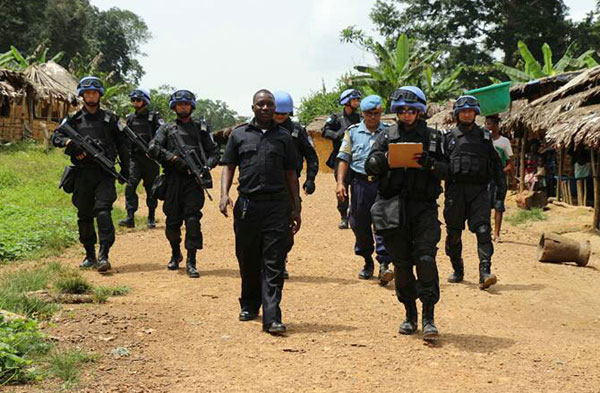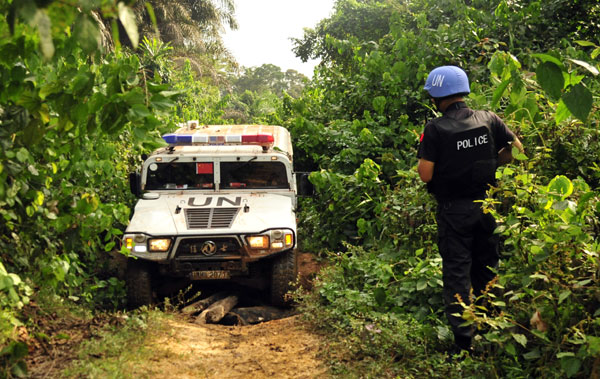|
 |
| Chinese peacekeeping police in armed patrols with local police and officers with the United Nations Mission in Liberia in December. Provided to China Daily |
The Chinese forces also helped train local police officers in criminal investigation and combat, he said.
|
Helping hands When Gao Zhiheng first arrived in Liberia, all she could think about were the swarms of mosquitoes flying around and threatening to spread malaria. Gao was one of the medical professionals deployed to the West African country as part of a Chinese UN peacekeeping force. Their eight-month mission started in October last year and included 134 police officers and six nurses and doctors. The peacekeepers also went through six months of training to prepare for their role, the Ministry of Public Security said. Medical equipment such as blood and cardiac analysis machines as well as oxygen supplies were also sent to help with emergency situations during the mission. Gao, in her 30s, said the medical team members were mostly left to their own devices in their mission areas of Sinoe, Rivercess and Grand Kru counties. "The natural environment was very harsh and medical facilities were poor. The Chinese medical team shouldered a heavy responsibility in caring for the peacekeepers," she said. "We also offered medical treatment to local residents who were injured, UN delegates and peacekeeping police officers from other countries." Gao treated more than 1,200 patients during her eight-month stint, including four who were critically ill and 54 who had contracted malaria. She also provided medical services to 37 peacekeeping police and army observers from 11 countries and regions. More medical professionals and equipment are needed to help ensure that the peacekeepers are able to carry out their missions safely and smoothly, Gao said. These include providing more X-ray and color ultrasound devices to further improve treatment, she said. By Zhang Yan |
"Once we received the specific task order from the United Nations Missions in Liberia, we would rush to the scene to assist in fighting crime," Xu said.
In a typical case last October, the Chinese officers arrived in Greenville and received an order from the UN over a mass incident in Sinoe.
They armed themselves with weapons including tear-gas guns, stun guns and police batons to assist local authorities.
At the scene, more than 400 citizens were destroying roads and blocking vehicles to protest against the government's decision in rejecting an Indian enterprise to occupy land to plant palm trees. The protesters felt that the company would be able to provide them with jobs.
"Some of them fought with the Liberian police. The safety of many people were threatened by the angry protesters," Xu said.
The Chinese officers immediately pulled a cordon to evacuate the crowd and protect the people and facilities. After an hour of negotiation, the protesters and authorities reached a settlement, he said.
Aside from carrying out orders from the UN, the Chinese peacekeepers would also conduct armed patrols on the streets or take helicopters deep into the remote forests of Rivercess or Grand Kru to investigate crimes reported by villagers, Peng said.
"We would arm ourselves based on the severity of the crimes reported," he said.
Their armament also included pistols, submachine guns, sniper rifles, bulletproof clothing and reinforced boots, he said.
Some of the most challenging work included missions deep in the forest. They had to carry at least 15 kg of equipment each on long treks under the sweltering sun and face the threat of being attacked by armed suspects, he said.
In March, the Chinese troops accompanied local police to investigate criminal activities in Shatan town of Rivercess county, where gunshots could be heard constantly, he said.
The Chinese peacekeepers later helped Liberian police set up the first local police station in the mountains.
Since March, the number of criminal activities in Shatan has declined by 30 percent compared with 2013.
During their eight-month stint, the Chinese peacekeeping police assisted in at least 27 tasks including those involving mass incidents and armed patrols.
Chinese technical experts and advisers also provided skills and tactics training to Liberian police to improve their combat capabilities, Sinoe county inspector Augustine Swen said.
"The Chinese police's efforts were conducive to promoting the relationship between China and Liberia, and enhancing the sense of security among local people. They made great contributions to rebuilding work and social development in Liberia," he said.
To recognize their outstanding contributions, the Chinese peacekeeping police in Liberia were awarded the UN Peace Medal in April.
More deployment
China, the largest contributor of personnel to the UN peacekeeping mission, will provide more expertise and training to fight transnational crimes apart from its traditional role of maintaining security and order, Sun, from the international cooperation bureau, said.
"On top of maintaining traditional public order and political stability, the peacekeeping tasks will become increasingly professional and specialized," he said.
Since 2000, China has deployed 2,032 peacekeeping police to eight countries and regions including Kosovo, Liberia, Afghanistan, Haiti and Sudan, Sun said.
China will facilitate training for foreign police officers and send more instructors and technical experts to help with security for large-scale activities, criminal investigation techniques, cyber security, exit and entry management, as well as some counter-violence or counterterrorism activities, he said.
"To further help UN peacekeeping efforts, we plan to send more police personnel to some African and European countries, such as Liberia and Cyprus, to provide skills training for local police and to improve their combat capabilities," said Yang Shaowen, deputy director under the ministry's International Cooperation Bureau.
China's latest contributions to Liberia for peacekeeping come amid the increasing threat of transnational organized criminal activity, including drug and arms smuggling, cybercrime, human trafficking and sexual offences, Yang said.
Dmitry Titov, an assistant secretary-general at the UN, said that among the five permanent members of the UN Security Council, China provides the highest number of peacekeeping police personnel and troops.
China will play a more active role in offering special training, experts, criminal investigation techniques and funding to countries in need, he said.
"Currently, we are working in environments with asymmetric and unconventional threats - including sectarian divisions, piracy and social tension.
"Peacekeeping will need to be more mobile, more flexible and adaptable."
Contact the writers at zhangyan1@chinadaily.com.cn and wangqian@chinadaily.com.cn
|
 |
| A Chinese peacekeeping officer patrols in Cestos, Rivercess county of Liberia in March. Gao Xuede / for China Daily |
